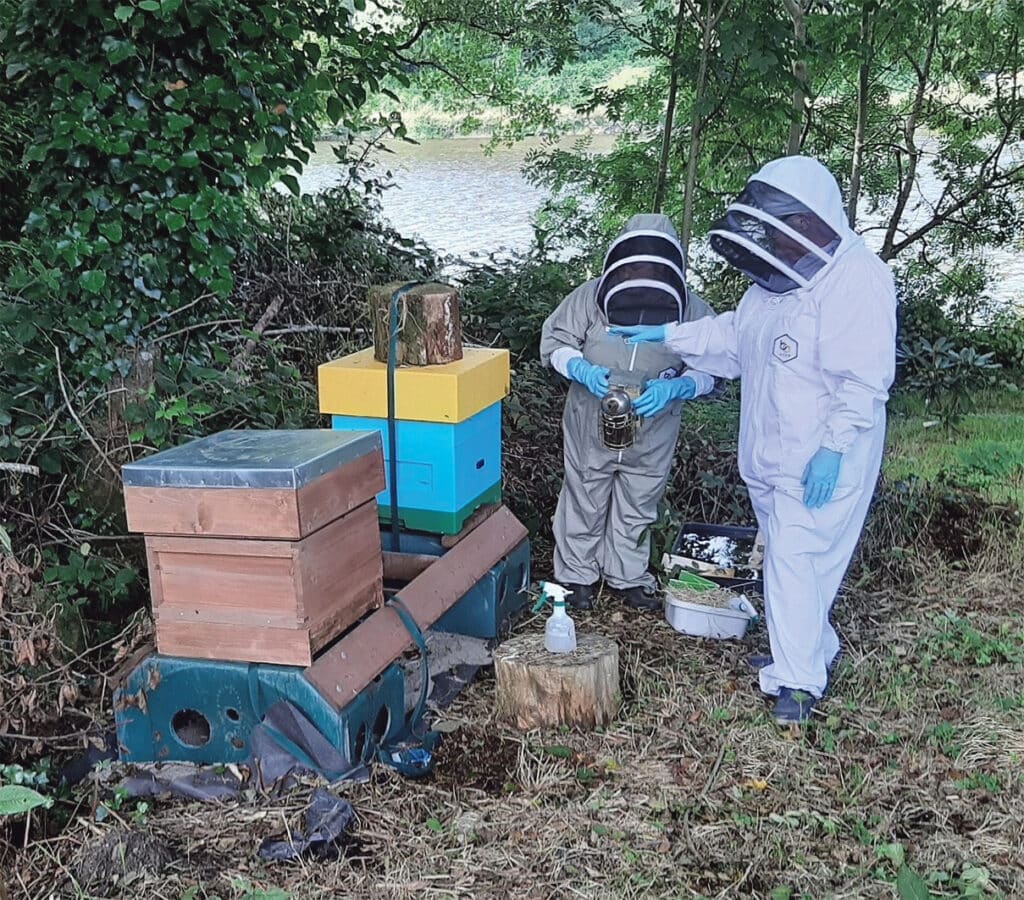Bees have been a part of Mairead Love’s life since childhood. As Chairperson of the Fastnet Area Bee-Keepers Association (FABKA), she gives an insight into the value of bees and pollinators. If you are interested in learning more and becoming a beekeeper join the association’s online training course in February at www.fastnetareabeekeepersassociation.net.

My late father was a prolific beekeeper so I picked up tips and tricks along the way. My siblings and I were gently persuaded (bribed) to work in the apiaries and do behind the scenes jobs also. We didn’t like it much but it provided pocket money. Adulthood took me into a professional role where bees were less prominent in my day-to-day life until some 25 years ago. Only then did I realise the value of bees and pollinators, as I had a fondness for gardening, I then became what I describe as a ‘keeper’ of bees with little or no input. It slowly dawned on me that the keeper of bees is one of the biggest threats to the bees’ future and I needed to know more about the management of diseases and be able to carry out thorough inspections to enable me to become a beekeeper. I’m still learning and, after most lectures or courses I attend, I realise that I must learn more. That’s the beauty of this wonderful craft – you get ‘sucked in’. Ten years ago I moved on and set up home in a little cottage in the midlands with a nice tidy acre out back. I now had time to spend with the bees and the plants. I met my husband later on during the time I was representing FIBKA (Federation of Irish Beekeepers Associations) as the ‘Queen Bee’ for a year where I had the honour of visiting various parts of the country for honey shows and so on. Michael originates from West Cork and helped his uncle with his bees when he was young (but he says hindered him). With no dragging or persuasion, I set off down south and brought the bees with me.
We should remember this: Fastnet Area was made famous in the bee world by the late FIBKA Member Diarmuid Griffin from Goleen who won the world cup for best in class at the prestigious London Honey Show, amongst the best of the best. Diarmuid used to meet my late parents, Finbar and Dody Dineen, at the FIBKA Annual Summer School held at Gormanstown County Meath. What a small little world we live in!
Our hope is that our new members and students will be able to attend the summer school at least once in their beekeeping life. It’s the one place for one week that visiting attendees from all over Ireland and around the World from all professions can rub shoulders and the common language is Bees. Great ‘craic’ to be had also!
We knew that there was no local FIBKA Association down in these parts and our nearest meeting place then was Cork City where we were members. But the journey on winter nights from home and back took so long – a four-and-a-half-hour round trip. We griped about this to the FIBKA management and this led to us starting our Fastnet Area Beekeepers Association FABKA in February 2020. The group is for local beekeepers who appreciate the benefits of belonging to the federation in this lovely country area and also for training. This is all done on a voluntary basis and we would like to thank our members for their help, especially Mary Downey, Katie West and Owen Kelly. Both Mike and I could not have done this without their invaluable support. 2020 was a challenge. Because of COVID restrictions we were unable to meet in the traditional way every month or do in-person training. This led to online training and the ‘hands on’ part has to catch up when we are permitted.
Our name, Fastnet Area Bee Keepers (FABKA), fits this area perfectly because on a fine day driving west from Cork City you get glimpses of coastline and then the Fastnet Lighthouse comes into view. We look out on the Fastnet from our home. Michael used to count the light reflections, as it circled on the bedroom wall, going to sleep when he was young. Unfortunately the lovely old reliable light was digitalised recently so that experience is no more, another bit of history lost forever.
New people joining these days are blessed with the wealth of beekeeping information available to them in print, video, and educational opportunities, which makes for fewer mistakes going undetected. The best teaching tool has to be the ‘Hands On’ approach, which we also provide for our students. We are proud to say that we have started a demonstration apiary for that purpose. There is also a greater awareness of the environment and the importance of pollinators. Teagasc, with the aid of Catherine Keena, are doing a great job for the bees by advising landowners to preserve hedgerow boundaries and fences for all pollinators because it is forecast that if the bees become extinct, so too will everything else: If our plants are not pollinated the food chain will diminish and its structure will be no longer viable and hence die out.
Years ago, when hundreds of country folk had a few boxes of bees at the end of the garden, there was no public media questioning decisions made or challenging law makers on their ill-informed approvals. But nowadays beginners and all levels of beekeepers can take heart that their small efforts are worthy and are creating a real awareness as to the importance of preserving life into the future. By being a member of FIBKA, through our FABKA association, we collectively have a louder voice in Europe with our association with the Irish DAFM Departments that deal with bees; and therefore will keep addressing the insecticide, pesticide issues and so on. We need to stop poisoning our land, sea, and air in the name of profit for massive pharma-type companies who have investor’s interests first. We would love to get younger farmers involved because they are key influencers in the preservation of pollinators; for example, the current generation of Irish farmers have planted approx 10,000 km of new native hedges, making it the most significant planting in more than 200 years.
The immediate benefit of joining FABKA is that you’ll meet fellow beekeepers, as we hold regular meetings in the Teagasc Office in Skibbereen. (currently restricted) All members are issued with a monthly magazine ‘An Beachaire’, which is not only a fantastic read but full of advice and links for all levels. Live demonstrations and workshops will be held periodically through the year, restrictions-permitting. Once you are a member of FABKA you can also join any other FIBKA Association for a small sum and avail of what they are offering. For the more academic there is an exam structure available and you can go up the grades, maybe even becoming a lecturer or judge, as many have.
On reflection, there is so much to be gained from caring for and learning about these fascinating creatures. What could be better than serving up your own honey to family and friends knowing that this is 100 per cent pure and hasn’t been adulterated, because the sad fact is proof of adulteration in mainstream product has been established. You might even learn to make candles, polishes, creams and soaps from the by-products from the hive. After an inspection of the bees a cup of tea and a honey cookie would be just what the doctor ordered!
There are enormous benefits to being a member of FIBKA. The list is a page on its own. For further information visit FIBKA online (irishbeekeeping.ie) and judge for yourself. Established in 1881 and reconstituted in 1943, FIBKA is the largest organisation of beekeeping associations in Ireland and is a not for profit federation. There are currently 48 affiliated associations with 2800 members (until update) So if any or all of this article has touched a nerve go to www.fastnetareabeekeepersassociation.net and join our training course, which will be hosted by qualified and experienced beekeepers, commencing February 17, 2021, covering eight modules. Apiary demonstrations will be done when restrictions are eased.


